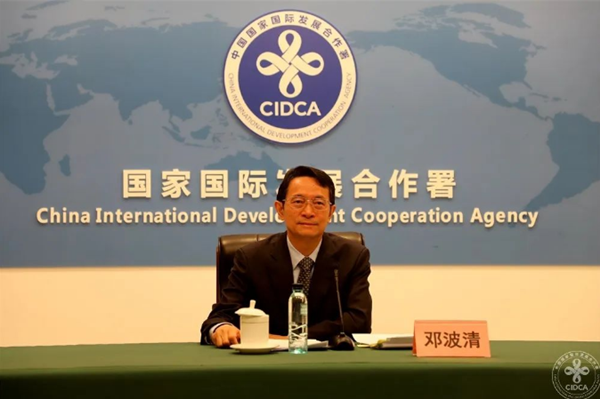CIDCA vice-chairman attends seminar on application of Juncao technology in LAC countries

A seminar themed on "Juncao technology and its role in supporting sustainable agricultural development and regional capacity building for achieving the 2030 Sustainable Development Goals in Latin America and the Caribbean (LAC) region" was held via video link on March 17. The seminar was jointly held by the China International Development Cooperation Agency (CIDCA), Fujian provincial government, and the Department of Economic and Social Affairs of the United Nations.
This was the second international promotional activity for Juncao technology after the Forum on the 20th Anniversary of Juncao Assistance and Sustainable Development Cooperation that was held on Sept 2, 2021.
Deng Boqing, vice-chairman of the CIDCA, attended and addressed the seminar.
Deng said Juncao technology is a successful practice that China has used to promote poverty alleviation and also an important contribution by China to global sustainable development. So far, Juncao technology has been applied in 106 countries and become a brand project of China's foreign aid.
The CIDCA is working closely with developing countries, including LAC countries, to promote the implementation of Juncao technology projects in more countries, help improve the sustainable development capability of agriculture in these countries and achieve the 2030 SDGs at an early date.
Deng said that China and LAC countries are all developing countries and that they have a comprehensive cooperative partnership featuring equality, mutual benefit and common development. The CIDCA will put development first and focus on key areas of cooperation to help LAC countries achieve sustainable development.
First, we will deepen cooperation in COVID-19 response. We will continue to offer help to countries in need of vaccines and medical supplies, carry out medical technology cooperation, and help improve the national public health system of relevant countries.
Second, we will provide more assistance for people's livelihood. We will prioritize small but useful projects in foreign aid by developing more small projects in agriculture and poverty reduction, public health systems, culture and education, and social development, which can benefit people in these countries.
Third, we will respond to development requests of LAC countries. While materializing the outcomes achieved at the third ministerial meeting of the China-CELAC Forum, we will share China's experiences in poverty reduction, economic and social development, and environmental protection with LAC countries, focus on cooperation in new areas such as climate change, digital innovation, and green development, and upgrade and improve the quality and efficiency of cooperation with LAC countries.
Fourth, we will carry out international cooperation and uphold multilateralism. We will align with the UN's 2030 Agenda for Sustainable Development, strengthen support for international organizations, and enhance exchanges with developed and developing countries. We will seek trilateral and multilateral cooperation while carrying out bilateral cooperation with other countries.
Guo Ningning, executive vice-governor of Fujian province, officials from the Republic of Trinidad and Tobago and the Republic of Nicaragua, a representative from the UN Department of Economic and Social Affairs, and Lin Zhanxi, chief scientist of the China National Engineering Research Center of Juncao Technology at Fujian Agriculture and Forestry University, attended the event and delivered speeches.
Representatives from more than 20 LAC countries and Chinese diplomatic envoys also attended the event.

Follow us on WeChat
京ICP备18041594号-1
京公网安备 11010202005508号

Follow us on WeChat


